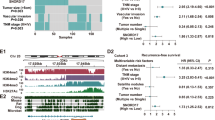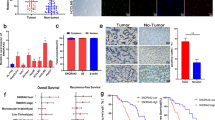Abstract
Small nucleolar RNAs (snoRNAs) as a novel molecular species may have significant and comprehensive influences on the development and progression of hepatocellular carcinoma (HCC). We recently characterized snoRNA transcriptome signatures in HCC tissues by small RNA sequencing and found that small nucleolar RNA 78 (SNORD78) was associated with HCC. However, little is known about the pathological role of SNORD78 in HCC patients. This study aimed to profile SNORD78 expression signature and then to explore the pathogenesis of SNORD78 in HCC. The real-time PCR results showed that SNORD78 was greatly upregulated in HCC tissues than adjacent noncancerous tissues (p = 0.004). Correlation analysis showed that high-level expression of SNORD78 was notably associated with tumor number (single vs. multiply, p = 0.02), stage (I∼II vs. III∼IV, p = 0.014), and distant metastasis (absent vs. present, p = 0.01) in HCC patients. Univatiate and multivariate analyses showed that SNORD78 was a significant prognostic predictor for overall survival and recurrence-free survival of HCC patients (hazard ratio = 1.375, 95 % CI = 1.125–1.680, p = 0.002; hazard ratio = 1.418, 95 % CI = 1.201–1.675, p < 0.001). Moreover, Kaplan-Meier analysis showed that high-level expression of SNORD78 was associated with short overall survival and recurrence-free survival of HCC patients (p = 0.023, 0.014). Functionally, knockdown of SNORD78 significantly inhibited cellular proliferation, migration, and invasion of SK-Hep-1 via inducing G0/G1 cell cycle arrest and apoptosis. In conclusion, SNORD78 may be associated with aggressive phenotype and poor prognosis of HCC.



Similar content being viewed by others
References
Roberts LR. Sorafenib in liver cancer—just the beginning. N Engl J Med. 2008;359:420–2.
Poh Z, Shen L, Yang HI, Seto WK, Wong VW, Lin CY, et al. Real-world risk score for hepatocellular carcinoma (RWS-HCC): a clinically practical risk predictor for HCC in chronic hepatitis B. Gut. 2016;65:887–8.
Galasso M, Sana ME, Volinia S, Non-coding RNA. A key to future personalized molecular therapy? Genome Med. 2010;2:12.
Sun X, He Y, Huang C, Ma TT, Li J. Distinctive microRNA signature associated of neoplasms with the Wnt/β-catenin signaling pathway. Cell Signal. 2013;25:2805–11.
Thirion M, Ochiya T. Roles of microRNAs in the hepatitis B virus infection and related diseases. Viruses. 2013;5:2690–703.
D’Anzeo M, Faloppi L, Scartozzi M, Giampieri R, Bianconi M, Del PM, et al. The role of micro-RNAs in hepatocellular carcinoma: from molecular biology to treatment. Molecules. 2014;19:6393–406.
Thorenoor N, Slaby O. Small nucleolar RNAs functioning and potential roles in cancer. Tumour Biol. 2015;36:41–53.
Matera AG, Terns RM, Terns MP, Non-coding RNA. Lessons from the small nuclear and small nucleolar RNAs. Nat Rev Mol Cell Biol. 2007;8:209–20.
Badhai J, Frojmark AS, DE J, Schuster J, Dahl N. Ribosomal protein S19 and S24 insufficiency cause distinct cell cycle defects in Diamond-Blackfan anemia. Biochim Biophys Acta. 2009;1792:1036–42.
Hariharan N, Sussman MA. Stressing on the nucleolus in cardiovascular disease. Biochim Biophys Acta. 2014;1842:798–801.
Trainor PA, Merrill AE. Ribosome biogenesis in skeletal development and the pathogenesis of skeletal disorders. Biochim Biophys Acta. 2014;1842:769–78.
Tanaka R, Satoh H, Moriyama M, Satoh K, Morishita Y, Yoshida S, et al. Intronic U50 small-nucleolar-RNA (snoRNA) host gene of no protein-coding potential is mapped at the chromosome breakpoint t(3;6)(q27;q15) of human B-cell lymphoma. Genes Cells. 2000;5:277–87.
Mei YP, Liao JP, Shen J, Yu L, Liu BL, Liu L, et al. Small nucleolar RNA 42 acts as an oncogene in lung tumorigenesis. Oncogene. 2012;31:2794–804.
Xu G, Yang F, Ding CL, Zhao LJ, Ren H, Zhao P, et al. Small nucleolar RNA 113-1 suppresses tumorigenesis in hepatocellular carcinoma. Mol Cancer. 2014;13:216.
Zheng D, Zhang J, Ni J, Luo J, Wang J, Tang L, et al. Small nucleolar RNA 78 promotes the tumorigenesis in non-small cell lung cancer. J Exp Clin Cancer Res. 2015;34:49.
Liao J, Yu L, Mei Y, Guarnera M, Shen J, Li R, et al. Small nucleolar RNA signatures as biomarkers for non-small-cell lung cancer. Mol Cancer. 2010;9:198.
Su J, Liao J, Gao L, Shen J, Guarnera MA, Zhan M, et al. Analysis of small nucleolar RNAs in sputum for lung cancer diagnosis. Oncotarget. 2016;7:5131–42.
Sun M, Jin FY, Xia R, Kong R, Li JH, TP X, et al. Decreased expression of long noncoding RNA GAS5 indicates a poor prognosis and promotes cell proliferation in gastric cancer. BMC Cancer. 2014;14:319.
Shi X, Sun M, Liu H, Yao Y, Kong R, Chen F, et al. A critical role for the long non-coding RNA GAS5 in proliferation and apoptosis in non-small-cell lung cancer. Mol Carcinog. 2015;54(Suppl 1):E1–E12.
Yin D, He X, Zhang E, Kong R, De W, Zhang Z. Long noncoding RNA GAS5 affects cell proliferation and predicts a poor prognosis in patients with colorectal cancer. Med Oncol. 2014;31:253.
Schneider C, King RM, Philipson L. Genes specifically expressed at growth arrest of mammalian cells. Cell. 1988;54:787–93.
ZQ T, Li RJ, Mei JZ, Li XH. Down-regulation of long non-coding RNA GAS5 is associated with the prognosis of hepatocellular carcinoma. Int J Clin Exp Pathol. 2014;7:4303–9.
Meng X, Franklin DA, Dong J, Zhang Y. MDM2-p53 pathway in hepatocellular carcinoma. Cancer Res. 2014;74:7161–7.
Giakoustidis A, Giakoustidis D, Mudan S, Sklavos A, Williams R. Molecular signalling in hepatocellular carcinoma: role of and crosstalk among WNT/ss-catenin, Sonic Hedgehog, Notch and Dickkopf-1. Can J Gastroenterol Hepatol. 2015;29:209–17.
Su H, Xu T, Ganapathy S, Shadfan M, Long M, Huang TH, et al. Elevated snoRNA biogenesis is essential in breast cancer. Oncogene. 2014;33:1348–58.
Zhang Y, Lu H. Signaling to p53: ribosomal proteins find their way. Cancer Cell. 2009;16:369–77.
Donati G, Bertoni S, Brighenti E, Vici M, Trere D, Volarevic S, et al. The balance between rRNA and ribosomal protein synthesis up- and downregulates the tumour suppressor p53 in mammalian cells. Oncogene. 2011;30:3274–88.
Acknowledgments
This study was funded by the National Basic Research Program of China (973 Program) (2012CB720600, 2012CB720605).
Author information
Authors and Affiliations
Corresponding authors
Ethics declarations
The study was approved by the medical ethical committee of Zhongnan Hospital of Wuhan University. All participants were Han population from China, who gave their informed written consent.
Conflicts of interest
None
Additional information
Pei Ma and Haitao Wang contributed equally to the work and should be considered as first authors.
Electronic supplementary material
Supplementary Fig. 1
Sequencing and amplification of SNORD78 (a) sequence of SNORD78 RT-PCR products by clone sequencing and (b) amplification of series of diluted SNORD78 products by RT-PCR assay (GIF 55 kb)
Rights and permissions
About this article
Cite this article
Ma, P., Wang, H., Han, L. et al. Up-regulation of small nucleolar RNA 78 is correlated with aggressive phenotype and poor prognosis of hepatocellular carcinoma. Tumor Biol. 37, 15753–15761 (2016). https://doi.org/10.1007/s13277-016-5366-6
Received:
Accepted:
Published:
Issue Date:
DOI: https://doi.org/10.1007/s13277-016-5366-6




